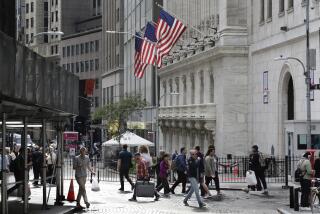CREDIT : Budget, Oil Worries Depress Bond Prices
Treasury bond prices slipped Thursday as the market remained concerned about another rise in oil prices and the continuing budget drama in Washington, traders and economists said.
The Treasury’s benchmark 30-year bond, which dropped $9 per $1,000 in face amount Wednesday, lost $1.56 more. Its yield climbed to 9.06% from 9.05% late Wednesday.
“It’s the same, same story. It all boils down to the budget and oil,” said Bob Sbarra, a senior vice president at the investment firm Carroll McEntee & McGinley Inc.
On the New York Mercantile Exchange, oil for November delivery rose $1.73 a barrel to $40.42, a record-high close for the exchange.
Higher oil prices increase the concern that inflation will accelerate. Inflation is one of the major worries of bond investors because it devalues fixed-return securities.
Meanwhile, the White House and Congress continued to tussle over a federal budget. The possibility that the government could run out of funds is a major concern to investors in U.S. Treasury securities.
The federal funds rate, the interest rate banks charge each other on overnight loans, was quoted at 7.938%, down from 8% late Wednesday.
In the tax-exempt market, the Bond Buyer index of 40 actively traded municipal bonds fell 1/8 point to 87 21/32. The average yield to maturity rose to 7.87% from 7.86% late Wednesday.
CURRENCY
Dollar Sinks With Foreign Confidence The dollar fell against most major currencies on concern about the health of U.S. banks and the belief among foreign traders that the United States is headed for a sharp recession.
“There’s a total lack of confidence in the U.S. now. Europe thinks the U.S. can close up shop,” said Jack Griffin, a dealer for Banque Indosuez in New York.
The dollar reached an all-time low of 1.5120 German marks before recovering slightly to end at 1.5138, down from Wednesday’s 1.5278 marks.
Against the Japanese yen, the dollar closed at 129.47, down from 129.48 yen Wednesday. The Japanese currency was hurt by fears that the Bank of Japan might intervene to support the dollar against the yen.
The dollar fared well in European trading on increased anxieties over the Persian Gulf crisis. But it dropped in New York as concerns about U.S. banks intensified on Chemical Bank’s move to cut its common stock dividend to 25 cents a share after posting a third-quarter loss of $43.7 million.
“It’s down hard today,” Marc Chandler, senior strategist with the consulting firm IDEA in New York, said of the dollar.
He said other factors influencing its drop included a general bearishness in the market, continued confusion in federal budget talks and tensions in the Mideast.
“We also continue to hear talk of Japanese life insurance companies raising their dollar hedge ratios,” Chandler said. “That means they’re selling more dollars to reduce their currency risk.”
In London, one British pound cost $1.9640 late Thursday, cheaper than Wednesday’s late $1.9755. But in New York, it cost $1.9775 to buy one pound, up from $1.9694 late Wednesday.
COMMODITIES
Silver Loses Shine; Gold Prices Inch Up Recession fears sent silver and platinum plummeting, and analysts say silver isn’t looking quite like the precious metal it used to be.
On other commodity markets, orange juice futures fell, oil futures surged, gold rose slightly, grains and soybeans retreated, cattle futures fell and pork futures were mixed.
Silver for December delivery on the New York Commodity Exchange closed down 17.7 cents at $4.285 an ounce, the lowest since 1976.
“It’s no longer a precious metal, it’s an industrial metal,” said Nick Hatch, a mining analyst at the London investment firm James Capel and Co.
“Both silver and platinum are suffering from mounting fears of an economic downturn,” added Thomas Butler, a precious metals analyst at the London investment firm Samuel Montagu & Co.
“Both these metals have very strong industrial bases and fears that a recession may emerge soon are obviously undermining prices,” he said.
On the Merc, platinum for January delivery fell $17 to $420.10 an ounce, approaching the mid-1986 low of $400.
The selloff in platinum started in Europe, and as it swept through New York, prices were left $50 below last Friday’s close.
Gold weathered platinum’s dive, closing $1.40 higher at $393.60 an ounce for December delivery on the New York Commodity Exchange.
“The Gulf crisis is providing support for gold that simply isn’t available to platinum as an industrial metal,” one dealer said.
Traders in orange juice futures braced for a price collapse after the government projected a 50% increase in Florida orange production this season, barring another significant freeze.
Consumers should see lower prices in grocery store freezer cases within weeks as retailers try to reduce their inventories of frozen concentrate, analysts said.
Orange juice futures fell sharply on the New York Cotton Exchange before the report, and analysts predicted that the near-term contract, for delivery in November, would plunge today its permitted daily limit of 10 cents.
Futures prices for wholesale frozen concentrated orange juice settled 0.85 cent to 2.55 cents lower in New York, with November at $1.299 a pound.
Several analysts said orange juice futures probably will keep falling to less than $1 a pound, a four-year low, in reaction to the Agriculture Department’s projection for a Florida orange harvest of 165 million 90-pound boxes.
More to Read
Inside the business of entertainment
The Wide Shot brings you news, analysis and insights on everything from streaming wars to production — and what it all means for the future.
You may occasionally receive promotional content from the Los Angeles Times.










